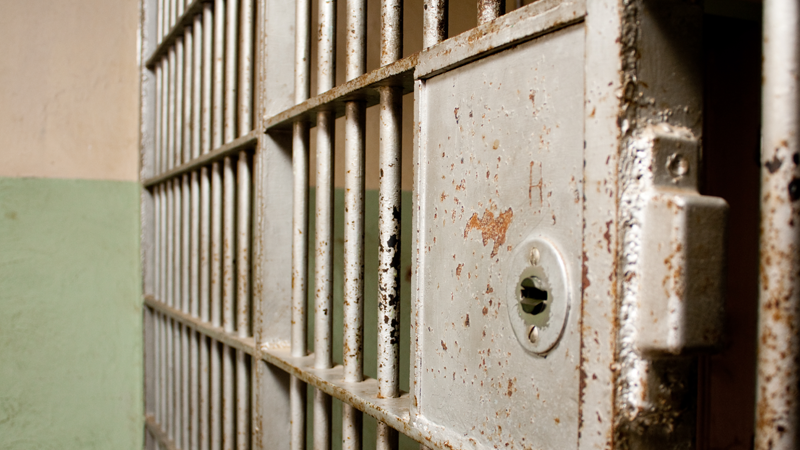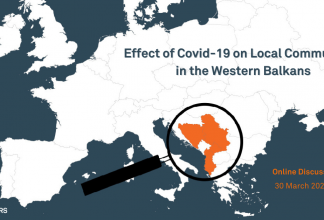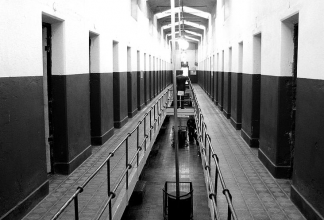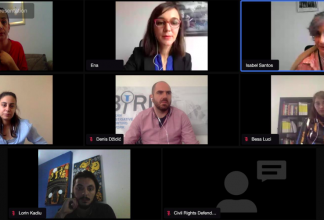Impact of Covid-19 Measures on Human Rights and Criminal Justice in Western Balkans and Turkey

As a region which experienced some of the harshest measures in response to the Covid-19 outbreak, Civil Rights Defenders has been taking a closer look at the key human rights derogations in the Western Balkans and Turkey, as well as their impact on criminal justice.
Albania
On March 24, the government declared a state of Natural Disaster for 30 days. On April 21 the government requested to extend the state of natural disaster until June 23. The request was later approved in Parliament
On April 16, the Criminal Code was changed and prison sentences were introduced with regards to the COVID–19 situation. These changes, which include prison sentences of 3-8 years, can be issued in cases of violation of preventative measures, when they had serious consequences for the health and life of the population. On the other hand breaking quarantine when the person has been mandated to self-isolate by health authorities risks a 2-3 year long prison sentence. It was positive that milder sanctions were approved in comparison to the initial draft proposed by the government which prescribed prison sentences of up to 15 years. However the sanctions remain very harsh, and their proportionality is in question. Negligent medical treatment in the Criminal Code is sanctioned with a fine or prison sentence up to 5 years, when it caused serious health damage, risked the life or caused the death of the person. When this caused HIV infection, it is sanctioned with 3-7 years in prison. Therefore, the doctors, despite being more informed on the risks of infection and having the knowledge and means to avoid it, are sanctioned less than a regular citizen.
Most importantly, the Constitution of Albania does not allow for an accelerated procedure of approval for laws that are to be passed with qualified majority, such as the Criminal Code. This Code is a law of crucial importance and its amendments need to be based on reliable research, and should be subject to public and parliamentary debate and consultations with civil society and other groups. In our view, the amendments of such important laws in violation of the procedures provided in the Constitution, when Courts and Parliamentary scrutiny is lacking or limited sets a dangerous precedent. In terms of Parliamentary scrutiny, on 16 April, there were 24 normative acts and legislation pieces on the agenda of the parliament, amongst which were also the changes to the Criminal Code. To justify the accelerated procedure, the amendments to the Criminal Code on infectious diseases were included in the agenda of the Parliament together with other amendments concerning domestic violence which were previously proposed and consulted for months. 30 human rights CSOs, including Civil Rights Defenders have reacted and considered the timing to be accelerated and insufficient.
In the Western Balkans, namely in Bosnia and Herzegovina and Kosovo, there were already cases in which the Constitutional Court ruled against some restrictive measures taken by the government concerning lockdown measures. In Albania, these measures are impossible to challenge at the moment as the Constitutional Court is not functional due to the high number of vacancies created as a result of the vetting process that is ongoing in the justice system. These provisions are not temporary and they will very likely remain in the Code.
Additionally, these sentences do not respond to an urgent social need, as there were fines in place for lockdown violations and there was not any high public disobedience. There were no arguments provided on why the administrative sanctions (fines) that were in place were not sufficient and criminal sentences were needed.
Finally, given the pandemic crisis, it is important to flag that states around the world are advised to reduce the number of prison population due to the added risks of a COVID-19 outbreak in confined spaces. In Albania the first cases of infection with COVID-19 in prisons have been reported. Meanwhile the government earlier in March, decided to release 600 prisoners temporarily, on the other hand, in April additional prison sentences were introduced. Another contradiction is that the government indicated that all fines issued so far for violations of COVID-19 measures would be waived, but warned that criminal sentences would be imposed.
The government decision of 23.3.2020 provided the permission for temporary stay at home for 3 months and it benefits only those who have been sentenced through a final decision of the court, not pretrial detainees, thus also leaving out even juveniles in pre-detention. The categories that benefited from this decision were: prisoners that have up to 3 years of prison sentence left and have not committed grave offences (there is a list of offences who are excluded from benefiting from this decision); also prisoners who have up to 5 year of prison sentence left, are 60 years-old or older who suffer from chronic diseases. The period of staying at home will be considered as part of the sentence.
Inmates have been provided the possibility to meet family and lawyers via Skype. Watchdogs have requested to be provided the opportunity for them to have meetings with inmates on Skype as well, to be able to receive complaints and monitor externally. No such measures has been taken yet.
As of March 10 the work of all courts is suspended until the end of the pandemic. There are some exceptions on which the courts’ activity can to continue. Some criminal cases that will not be suspended are: the validation of the arrest in flagrance or detention, reviewing of security measures of “prison arrest” or “house arrest”; cases concerning detained or arrested juveniles; urgent cases regarding important evidence. It is positive that this allows lawyers to access courts to request alternative measures to detention. Public access to trials is limited.
When possible the lawyer and arrested or detained person participate in the trial remotely, through audio visual means. As of 6 April, some online hearings are conducted from the Special Court against Corruption and Organised Crime. It is to be seen how these measures will be implemented in the criminal justice system. Concerns are being raised with regards to the violation of the cross examination principle e.g when questioning witnesses. Also there is a possibility for decisions taken from courts during this period to be challenged later and declared invalid because none of the Codes of Procedures have any provisions to support this government decision. Similar concerns are being raised in the regions as well. Namely the Bar association of Serbia invited lawyers to boycott these online proceedings, since they are in violation of the rule of law.
Many budget lines were reallocated to the Ministry of Health. The Ministry of Justice budget on state provided legal aid was affected and reduced. For years the main legal aid providers in the country have been CSOs supported by international donors.
As of April 1, the Government informed the General Secretariat of CoE on the necessity to derogate from certain obligations under the ECHR. The articles concern private life, freedom of movement, right to property, right to education and public assembly, therefore there are no direct implications to criminal justice at the moment, but it is worth mentioning as an unusual measure. No similar measure is taken in any of the EU countries who have the highest number of cases and fatalities with COVID-19 meanwhile such derogations are applied from countries like Albania, Serbia, North Macedonia, Romania etc.
Bosnia and Herzegovina
A state of Natural Disaster was proclaimed on the 17th of March 2020, entering into force the same day, with no end date given. The state did not notify about the derogations under ICCPR nor European Court of Human Rights (ECHR).
Republika Srpska (RS)
The first decision that affected freedom of assembly was adopted on 17th March. The decision contained a provision banning all assemblies in RS, however, it did not provide any explanation for the grounds on which the decision was taken. This decision was prolonged until 13.04.2020.
On 21st March the government adopted a decision on introducing a curfew for all citizens of RS, limiting freedom of movement, in the timeframe from 8pm and 5am. People older than 65 were prohibited from moving at all, with some exceptions such as to visit the doctor, buy groceries, go to the bank or carry out any other existential task. From 30th March, until 13th April, people older than 65 were allowed to go outside on Tuesdays and Fridays, from 7am until 10am, whereas in rural areas, people older than 75 were allowed to go outside only for the purpose of agricultural work, in addition to the aforementioned reasons. A decision on a complete curfew during weekends was introduced in RS, and was implemented throughout April and half of May 2020. During this time, nobody without a valid reason was allowed to go outside.
Restrictions on freedom of expression in this entity created potential for the rule of law to be undermined in this part of the country as well. Fines for spreading false information were introduced in late March, and increased to up to 9000BAM (4.500EUR) on 6th April , 2020. So far 5 people have been sanctioned for spreading panic and false information, including a medical doctor for sharing her concern over the lack of capacity in local hospitals. The law was lifted but the sanctions are believed to remain.
A state of emergency in the entity was declared on 28 of March 2020, entering into force the same day, and an end date for the decision was not given.
Federation BiH (FBiH)
A state of disaster in the entity was declared on 16th of March 2020, entering into force the same day, and an end date for the decision was not given.
A decision banning all gatherings was adopted on 18th March and on 31st March was prolonged until further notice.
On 20th March the government introduced a measure banning freedom of movement for all persons older than 65 and younger than 18. Seven days later, this measure was prolonged until further notice. This decision raised a lot of concerns among citizens of the FBiH, for its discriminatory effects and for its impracticability. After pressure from the public and civil society, this decision was amended and persons older than 65 were allowed to go outside from 8am until 12pm and persons younger than 18 were allowed to move around in a car. After the decision of the Constitutional Court BiH, ruling that the decision violated the rights of the people, the ban was further relaxed and currently elderly persons can go out on Mondays, Wednesdays and Fridays from 8am until noon (12h), while minors can go out on Tuesdays, Thursdays and Saturdays from 14-20h.
The FBiH has also started investigations into individuals for spreading panic and false information, and they have reported that there are currently 5 people under investigation for sharing social media posts. The content of these posts is unclear, but the trend of sanctioning expression on social media is worrying, as it is in the RS.
In addition, on 7th April 2020 the government of FBiH issued a decision restricting access to press conferences for the media. The decision stipulates that only 3 media representatives can be present at press conferences given by the Crisis Management Headquarters.
Parts of FBiH and Montenegro also saw cases of violation of privacy, through the publishing of the names of people in mandatory self-isolation/.RS also published the names of people who were breaching isolation rules. The FBiH Agency for the protection of privacy ruled that this was a violation of the right to privacy. See further information here.
Kosovo
In Kosovo since 16th March 16 courts and prosecution have suspended their activities and are dealing only with urgent cases: juvenile cases, domestic violence, validation of detention etc. Their staff has been available over the phone. On 8th May, the Kosovo Judicial Council, in line with government measures for progressive lifting of the restrictions, issued a decision that courts can take cases where the presence of the parties is not necessary.
Since April, the Conditional Release Panel, a separate and independent decision-making authority, has held ten hearings, and reviewed 179 requests and proposals for conditional release. In total, 70 requests have been approved. There is no information on how many of these requests were related to COVID-19. On 20 April, a number of prisoners from the Detention Center in Pristina refused breakfast as a sign of revolt for not being released earlier. So far, there have been no early releases of prisoners.
The Kosovo Judicial Council, Kosovo Prosecutorial Council, Bar Association and Justice Academy hold regular online meetings and trainings.
The Constitutional Court declared the government decision placing restrictions on movement and public gatherings unconstitutional. The Court unanimously ruled that the decision violated Article 55 of the Kosovo Constitution, which states that the fundamental rights and freedoms it guarantees may only be limited by the government providing that this should be done explicitly by law.
North Macedonia
In North Macedonia there is a general ban on gatherings of more than two persons which is generally respected with the exception of religious gatherings which are not sanctioned by the authorities.
The Parliament was dissolved due to the elections that were scheduled for 12th April 12, therefore there is one less control mechanism because the Parliament cannot hold sessions.
The execution of prison sentences of up to 3 years is postponed until 1st September, except for cases that might expire. There have been no early releases from prisons due to COVID-19. All new inmates are being put in isolation, while visits are forbidden.
Courts’ activities are suspended, including the administrative, civil, and constitutional courts. In the next period, the courts will continue trials only of urgent and unpostponable cases, i.e., detention ; criminal cases for which there are limitation periods; and criminal cases that are in the decision-making stage.
544 police officers and about 100 inspectors will be assigned to jobs in the Ministry of Interior, and will be able to act with full authority without taking the state exam. Their exams were postponed due to the pandemic.
The government cut 500k euro in funding for CSOs without any kind of consultation with the relevant stakeholders.
Serbia
A state of emergency in Serbia was declared on 15the March 2020, in order to limit the spread of COVID-19. It was declared by the President of Serbia, without a session of the parliament, but only with signatures of the Prime Minister and the President of the National Assembly.
Government decisions about the police curfew and its gradual extension followed in the coming days (16th March, 18th March, 21th March, 22th March, 28th March, 3rd April and 8th April) imposing limitations on the right to freedom of movement and freedom of assembly. The curfew was extended to the entire weekend from 10th April in the afternoon until 13th April in the morning. For the following weekend during Orthodox Easter, the curfew lasted for 84 hours in total. A large number of decisions and constant changes in provisions regarding the right to freedom of movement in a short period created confusion and uncertainty among citizens. Starting from 21st April, a previously announced reduction in limitations on movement slowly began with the shortening of the curfew and the elderly being allowed to leave their homes, but only for half an hour a day.
Moreover, citizens experienced unequal treatment by the authorities with respect to violations of the curfew measures . While two farmers were fined for coming back from the field during the curfew, several celebrities who were sitting together in a group of over twenty people at a hotel in Belgrade were only reprimanded. In addition, members of the Government’s crisis management unit stated at one of its press conferences that farmers will not be affected by the measures while they are performing activities necessary to grow crops.
This situation resulted in numerous limitations to human rights, especially with respect to already marginalized groups, such as Roma, elderly, women and migrants. Restriction on movement during the curfew led to an increase in cases of domestic violence, poverty and had negative implications on people’s health, especially for the elderly who were not allowed to leave their homes at all for over a month.
The introduction of remote hearings and trials during the state of emergency severely affected the right to a fair trial. The Serbian bar association called on lawyers to boycott court proceedings in response. On 31st March, the government adopted a decision that all COVID-19 related information could come only from the government’s crisis management unit, and that local health centers and public officials were not allowed to share any related information. This decision was revoked three days later, due to the harsh criticism from both local human rights defenders and the international community.
One journalist was arrested in the meantime, for an article she wrote on the situation in a hospital in Serbia, which noted there was a lack of equipment and safety measures taken to limit the spread of the virus. Unjustified limitations to the freedom of expression continued to take place. The government decided to hold daily press conferences on COVID-19 related updates without the physical presence of journalists. Journalists could send questions via email half an hour before the conference and there was no interaction between the members of the government’s crisis management unit and journalists. Independent media outlets reported that many of the questions they sent prior to the press conference have not been answered, especially those related to public procurements and overall transparency. See further information here.
According to the most resent research conducted by a local CSO, covering the period from 4th March to 17th April, the vast majority of national television programs were dedicated to the representatives of ruling structures. Representation of the ruling party increased by 99% in the aforementioned period in platforms relating informative content, such as political talk shows and official press conferenes. Reporting on the opposition is mostly negative on these television channels.
Turkey
In terms of rights and freedoms, the fundamental problem in Turkey is the erosion of the rule of law, which has reached unparalleled levels especially since the attempted coup d’état on 15 July 2016. Since then, the human rights situation has sharply deteriorated, and human rights abuses have been seen in a wide range of sectors not previously affected. Human rights defenders in Turkey undergo various forms of reprisals, discrimination, harassment and attacks. However, it is not possible to argue that the COVID-19 pandemic particularly worsened the situation in terms of the rule of law.
Turkey did not introduce a state of emergency due to COVID-19, but the main problem regarding the measures adopted in relation to the pandemic is the process of decision making.
It can be said that the measures (curfews, bans on travel between cities, closure of certain business) are within acceptable limits.
A body, called the “science council”, which is composed of healthcare professionals and academics, suggests the necessary measures to the government and then the government adopts the measures. However certain groups, such as the Turkish Medical Union, are not included in the science council, probably because of their dissident political position. This creates a problem in terms of transparency, pluralism and accountability.
Another issue regarding the measures is how they are introduced. Some of the measures, such as curfews and travel bans, bring very serious restrictions regarding fundamental rights and freedoms. But they are introduced as presidential decrees or government communiques, not as laws after parliamentary discussions.
On 12th April 2020, the parliament adopted a law which enabled the early release of up to 100,000 prisoners in the face of the COVID-19 pandemic. However, political prisoners, criminals of thought and arrested journalists were excluded from this regulation. The exclusion of political prisoners from early release measures was criticized by human rights defenders.
Turkey’s main opposition party, the CHP, applied to the Constitutional Court for the annulment of the newly enacted prisoner release law, with respect to the law’s form. According to the CHP, the legal amendment is a “covert special amnesty,” which requires the approval of at least three fifths of lawmakers in the parliament.
The number of COVID-19 cases in prisons is increasing, however it is not possible to obtain accurate information regarding the numbers. The given numbers are official figures provided by prosecutors’ offices; there is no independent civil society access to prisons for monitoring.
Turkey has postponed all trials which are not “urgent”. One of the criteria for urgency is whether the defendant is in pre-trial detention or not. If the person is not in prison, the trial is postponed. But for the defendants who are already in prison, trials are going on as scheduled.
(Article originally published on FairTrials.org)


